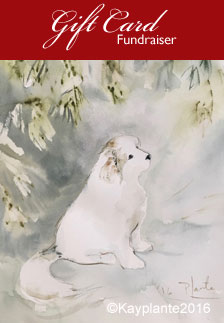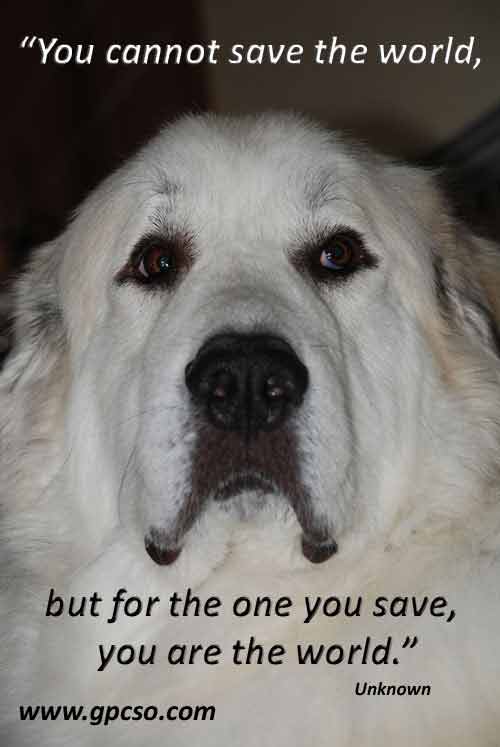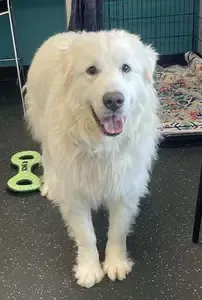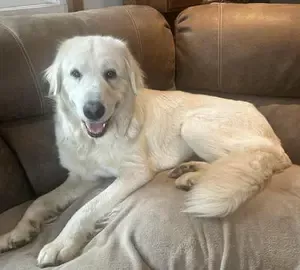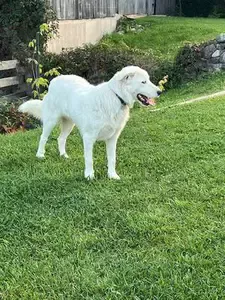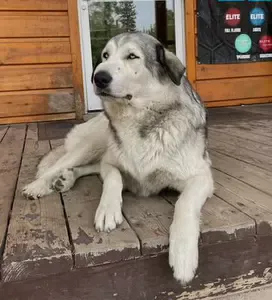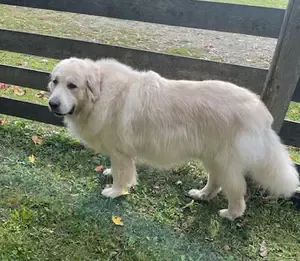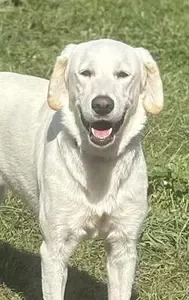Guardianship Traits
What is the link between guardianship and separation anxiety? Lots of questions (and helpful answers) on these pages!
The guardian genetics of the Pyrenees is generally thought to be its strongest character trait. It's also safe to say that the degree of guardianship tendencies may vary with individuals of this breed.
This site has been a lifeline for 2 experienced dog people with their first Pyr, I can tell you, as we quickly realised that our new dog is unique in every way by comparison to every other canine that lived their life with us.
A 'real busybody', we call him. He lives with 2 retired humans, an older dog and a cat (who thinks he's a dog). Separation anxiety has not been an issue with him. So, why is this so? And why is it so extreme in some other Pyrs, that they engage in destructive coping behaviour when left alone at home?
Perhaps the key to that is: a)guardian genetics as opposed to learned (trained) guarding
b)inability to cope with separation from their 'flock' that is stronger in some individuals than others and,
c) genetic programming that will not allow these dogs to over-ride the need to be with their flock at all hours, in all conditions and circumstances.
So, 'learned guarding' can be refined, added to, and specific coping skills taught, right?
Is this even possible with a Pyrenees, whose guardianship is inborn? Whose 'flock' could be comprised of individuals in a home or, stock in a field? And, whose other best character trait is having their own mind about all things?
Weigh in, readers! I'd like to know!
Comments for Guardianship Traits
|
||
|
||
|
||
|
||
|
||
Breaking News
-
Flocon
Feb 22, 26 05:13 PM
DOB: Approx. Jan. 26, 2025 (don’t know for sure) rescued Jan. 2026 Location: Acton, Ontario Maybe this is the boy with whom you an enjoy your life. -
Bo
Feb 10, 26 11:36 AM
DOB: late Sept 2023 (don’t know for sure) rescued Dec 2023 Location: Acton, Ontario Name: Bo Single dwelling home with a securely fenced yard of at -
Courtesy Post - Sarge
Jan 20, 26 01:13 PM
*STAYING IN THE FAMILY* Courtesy Post - Sarge Location: Mount Albert, Ontario DoB: Unknown 2023 Required: He is comfortable around livestock, but -
Hardy
Dec 26, 25 06:23 PM
Hardy Location: Acton, ON DOB: Approx. January 2025 (we think he is older though) Single-family home required. Minimum 5-foot securely fenced yard. -
Ronnie
Nov 22, 25 06:20 AM
*Adopted* Location: Acton, ON DOB: 9-years-old This big sweetheart went to foster and was soon adopted before we got him posted. From the shelter: -
Lola
Nov 19, 25 12:01 PM
*ADOPTED* A single family dwelling and a securely fenced yard of at least 5 feet are musts. DOB approx: Februay 12, 2021 Location: Acton, Ontario This -
Mayne
Nov 07, 25 04:04 PM
*ADOPTED* (FOSTER FAIL) Mayne Location: Acton, ON DOB: August 5, 2017 (8-years-old) Single-family home required. Minimum 5-foot securely fenced yard. -
Courtesy Post - Remi
Oct 17, 25 11:09 AM
*ADOPTED* Remi (Retriever/Pyr cross) D.o.B: Sept. 30, 2023 Location: Between Owen Sound and Port Elgin (Tara, ON) Remi was given up because of health

